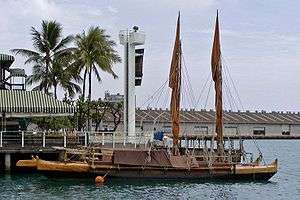Hawaiiloa
Hawaiʻiloa is the hero of an ancient Hawaiian legend about the settling of the Hawaiian Islands.[1] After having accidentally stumbled upon the islands, he returned to his homeland which he called Ka ʻāina kai melemele a Kane, "the land of the yellow sea of Kane". He then organized a colonizing expedition that included his family and eight other skilled navigators. They settled on what is now the Island of Hawaiʻi, named in his honor.[2]
The legend contains reference to his children: Kauaʻi (son), Oʻahu (daughter), and Maui (oldest son), who settled on the islands that bear their names.

The story of Hawaiʻiloa has received a great deal of attention from modern Hawaiians, as a realistic depiction of the settling of the islands, consistent with current anthropological and historical beliefs. Many people believe it is a validation of the veracity of ancient Hawaiian oral traditions.
It is perhaps from such a motive that the voyaging canoe Hawaiʻiloa was named after the legendary navigator. This canoe was built and sailed to prove that Polynesians were bold, intentional navigators, not the hapless voyagers blown off course that some theories of Polynesian migration claimed. The canoe Hawaiʻiloa is now docked at Honolulu Harbor. It is often sailed on long voyages throughout the Pacific Ocean in hopes of studying voyaging techniques used in antiquity.
However, the story of Hawaiʻiloa is attested only by late sources, such as the antiquarians Abraham Fornander and Thomas George Thrum. As they did not give their original Hawaiian sources, but only digests and compilations, we cannot be sure that the tale has not been slanted towards proof of Fornander's now discredited migration theories, or that it has not been elaborated by 19th century Hawaiians eager to stress the validity of their own beliefs.
Hawaiʻiloa is not mentioned in early Hawaiian sources like David Malo or Samuel Kamakau. Malo says that there are many stories of the origin of the Hawaiians, and cites some migration tales, some legends of indigenous origin. He does not mention Hawaiʻiloa. Kamakau says that the first man and woman were Hulihonua and Keakahuilani, and that they were created on Oʻahu.
See also
References
- ↑ The legend of Hawaiiloa by Bruce Cartwright
- ↑ "Origins of Hawaii's Names". Retrieved 2007-02-24.